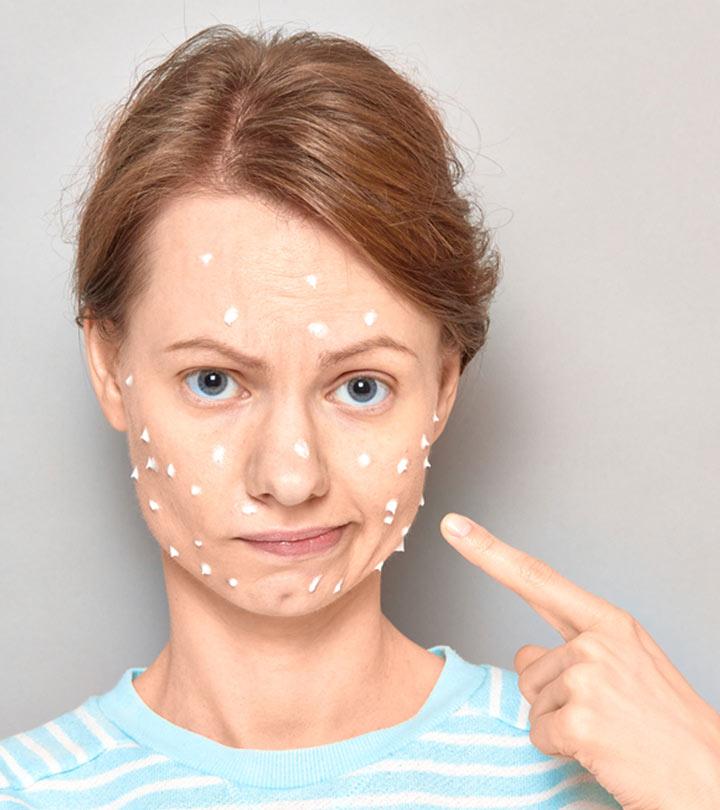Toothpaste For Pimples
Everything you need to know before using your toothpaste to manage those pesky bumps.

You wake up one morning to find a scary new zit on your otherwise blemish-free face. What do you do? You might have heard of friends or coworkers just slathering on toothpaste to dry out their pimples. But can it really be that easy? Does this mean that you might never have to buy another skincare product in your life?
This article breaks down all the facts regarding the use of toothpaste on pimples. Read on to know more.
Though toothpaste may seem like an economical treatment for pimples, the effects can be extremely harmful in the long run. It may also cause allergies and adverse reactions.
Toothpaste gives an illusion of healing a pimple by drying the skin out. While this may appear good, it also has many potential risks. Toothpaste is intended to be used on the tough tooth enamel and contains hard chemicals, including alcohol. These chemicals can leave your skin dry and irritated.
Toothpaste may also increase the risk of cancer (1). It contains certain ingredients that may pose a risk. We discuss these in the following section.
In This Article
Toothpaste Ingredients
Some common ingredients in toothpaste are triclosan, sodium lauryl sulfate (SLS), glycerin, sorbitol, fluoride, and sodium hydrogen carbonate (or baking soda) (2).
These ingredients are researched and deemed fit to keep your teeth clean before being included in toothpastes. However, the same cannot be said for the soft, supple skin on your face. Baking soda can throw the pH of your skin out of balance, leaving your face inflamed.
Let us now understand what science says about the use of toothpaste for treating pimples.
What Does Science Say?
Toothpaste cannot kill the bacteria that cause pimples. It was not meant to be used on skin. It may even have a detrimental effect on your skin in the long run. There is no evidence to prove that toothpaste can help with acne. You probably will not hear your dermatologist recommend it either.
Let us look into the reasons toothpaste cannot help treat acne.
- Toothpaste May Contain Drying Agents Like Alcohol
Toothpaste may also contain alcohol. Anecdotal evidence suggests that applying alcohol to skin for longer periods may dry the skin out.
- Toothpaste Contains Triclosan
Triclosan is another ingredient in toothpaste. If applied to skin, it is known to cause irritation and allergies (3). It is most often used as a preservative and may harm the skin.
The FDA has made it illegal to use triclosan in soaps and body washes (4). However, toothpaste is still permitted because of its properties that help combat plaque and other oral diseases.
It is now clear that using toothpaste for treating acne may only cause more harm. But are there alternatives? What can you do to treat your acne?
What Can You Use For Treating Acne?
The best way to treat acne is opting for approved acne spot treatments. Such treatments will also reduce the risk of side effects like rashes or other allergic reactions. The treatments usually use benzoyl peroxide due to its bactericidal properties (5). You can also consult your dermatologist for more information on the treatment options.
You may also make use of the following for treating acne.
- Acne-Specific Products
Go for products specifically meant to treat acne. These products often contain substances with topical retinoids. They are available over-the-counter and can be bought from any medical store.
The AAD (American Academy of Dermatology) states that you should wash your face with a mild cleanser, after which you can apply 2.5% benzoyl peroxide cream to the affected area (6).
You may also use sulfur-based treatments for treating acne. Even salicylic acid can be highly effective for your skin as it can counteract the harmful effects of acne (7).
- Natural Home Remedies
Tee tree oil is quite popular for treating acne. Studies suggest that using tea tree oil on acne can help reduce the associated inflammation too (8). However, since tea tree oil is too strong, just a few drops are enough to help reduce the blemishes. The oil also works as an effective spot treatment.
Another effective remedy could be white willow bark, which is known to have some protective effect against acne (9).
Anecdotal evidence suggests that products containing charcoal and clay may also help treat acne. However, consult your dermatologist before using charcoal or clay for treating acne.
As seen, toothpaste is not suitable for treating acne. In fact, it also poses certain risks. We will briefly explore them in the next section.
What Are The Risks Of Using Toothpaste On Acne?
Using toothpaste on your acne could initially dry them out. This can cause your body to overproduce the skin oils to restore your skin to its normal state. This may eventually lead to a bigger acne outbreak.
Toothpaste also may contain other chemicals to deter tooth decay and kill the bacteria in your mouth. These chemicals may cause undesirable reactions on your skin. Overdrying your skin can also rob off its softness and texture. The chemicals in toothpaste are usually strong enough to clean your teeth enamel, and may not suit your face.
Leaving toothpaste on skin may also cause contact dermatitis, whose symptoms include skin redness and inflammation (10).
Toothpaste also may contain sodium lauryl sulfate, a compound with antimicrobial activity. But this compound, upon skin contact, may cause inflammation (2).
What Kind Of Toothpaste Should You Avoid?
While all toothpastes are generally harmful to your skin, some containing fluoride can be worse. These toothpastes can cause pimples on your cheeks or around your mouth when they come in contact with the skin while brushing (11).
Some believe fluoride toothpastes may also disturb the skin’s pH balance. However, more research is warranted in this regard.
Most of us are guilty of using toothpaste for pimples and occasional breakouts. While some swear by this quick fix for breakouts, it is best to avoid using toothpaste for acne. Toothpaste may have a drying effect on the zit and may seem to work, but trust us, it does not! Instead, toothpaste may further irritate the breakout and worsen the condition. Better treatments and potent ingredients (like salicylic acid) are available to help you deal with your breakouts, so you can consult the doctor and follow the prescribed treatment.
Key Takeaways
- Toothpaste to treat acne is a popular home remedy, but it may cause more harm to your skin than good as it contains harsh chemicals that are not suitable for the skin.
- Toothpaste may reduce acne by drying it out, but this can lead to bigger acne breakouts in the future.
- Alternatives to toothpaste for acne include spot treatment with tea tree oil, or formulas containing benzoyl peroxide.
Frequently Asked Questions
Can toothpaste cause acne?
The chemicals and ingredients present in toothpastes may cause skin irritation and aggravate the acne on your skin.
Can toothpaste burn your skin?
Yes, toothpastes contain ingredients like baking soda and alcohol which may cause skin irritation, rashes, and a burning sensation.
Can I put toothpaste on a lip pimple?
No, avoid putting toothpaste on a lip pimple. Toothpastes contain ingredients like alcohol and baking soda that may cause skin dryness and irritation. Consult a dermatologist for proper treatment.
Does baking soda toothpaste help acne?
No, ingredients like baking soda may not be as effective as prescribed medications in treating acne (12).
Sources
Articles on StyleCraze are backed by verified information from peer-reviewed and academic research papers, reputed organizations, research institutions, and medical associations to ensure accuracy and relevance. Read our editorial policy to learn more.
- Recent Evidence Regarding Triclosan and Cancer Risk
https://www.ncbi.nlm.nih.gov/pmc/articles/PMC3945593/ - ROLE OF DIFFERENT INGREDIENTS OF TOOTH PASTES AND MOUTHWASHES IN ORAL HEALTH
https://applications.emro.who.int/imemrf/J_Pak_Dent_Assoc/J_Pak_Dent_Assoc_2011_20_3_163_170.pdf - Triclosan
https://pubchem.ncbi.nlm.nih.gov/compound/Triclosan - FDA issues final rule on safety and effectiveness of
antibacterial soaps https://www.fda.gov/news-events/press-announcements/fda-issues-final-rule-safety-and-effectiveness-antibacterial-soaps - Benzoyl Peroxide
https://www.ncbi.nlm.nih.gov/books/NBK537220/ - Comparing 2.5%
5% - Salicylic acid as a peeling agent: a comprehensive review
https://www.ncbi.nlm.nih.gov/pmc/articles/PMC4554394/ - Melaleuca alternifolia (Tea Tree) Oil: a Review of Antimicrobial and Other Medicinal Properties
https://www.ncbi.nlm.nih.gov/pmc/articles/PMC1360273/ - Pleiotropic Effects of White Willow Bark and 1
2-Decanediol on Human Adult Keratinocytes - Oral Health Topics
https://www.ada.org/en/member-center/oral-health-topics/toothpastes - Fluoride toothpaste: a cause of acne-like eruptions
https://www.osti.gov/biblio/5118510-fluoride-toothpaste-cause-acne-like-eruptions - A randomized controlled trial on the effectiveness of baking soda – acetic acid solution as an
adjunct to benzoyl peroxide in treating acne vulgaris among Filipino teenagers and adults
https://library.uerm.edu.ph/kohaimages/UERM/repository/Health%20Sciences%20Journal/Vol2%20No1%20January-June%202013/HSJ%20vol.2%20no.1%202013-18-22.pdf










